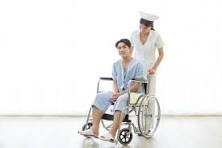
Young Stroke Patient Image for illustration
ABUJA, Nigeria – Stroke, long seen as a disease of ageing, is now ambushing Nigeria’s youth with alarming speed and cruelty. Once rare among those under 40, it is crippling young adults in their 20s and 30s—cutting short ambitions, draining families, and straining the nation’s fragile health system. Juliet Jacob, writes.
Globally, the World Health Organisation (WHO) records 13.7 million new strokes annually, with 5 million deaths and another 5 million left permanently disabled.
In Nigeria, strokes strike an estimated 200,000–250,000 people each year, with a fatality rate nearing 40% within 30 days—among the highest in the world.
“Stroke does not just take lives—it takes livelihoods,” warns Dr. Charles, a public health expert in Abuja. “When young breadwinners collapse in their most productive years, families are thrown into poverty, and the economy suffers. This is not just a health crisis; it is a social and economic time bomb.”
A Rising Tide: The Numbers Behind the Crisis
Stroke prevalence in Nigeria: 1.14 per 1,000 people.
Case fatality: 40% within 30 days.
Among youth under 50: 1 in 4 cases, according to the SIREN study.
In Nigeria, strokes under 40 years: 12.9% of cases, compared to less than 5% in richer nations.
Hospital data paint a stark picture: in southwestern Nigeria, mortality among young stroke patients reaches 28% within one week and 46% within six months.
The Hidden Economic Blow
Stroke is bleeding Nigeria’s economy. With over 60% of the population under 35, losing them to long-term disability devastates productivity.
In Kano, the average cost of treating a stroke patient is ₦102,983 ($251).
Families spend an average of ₦500,000 on rehabilitation, often out-of-pocket.
The loss in labour efficiency and caregiving hours runs into millions of naira annually per patient.
Globally, stroke-related losses equalled $2,059 billion in 2019. In Nigeria, where 80% of workers operate in the informal sector without insurance, the burden pushes households into poverty.
Why Are Young Nigerians at Risk?
Unhealthy diets: Junk food, imported processed meals, and sugary drinks.
Sedentary lives: Desk jobs and urbanisation—less than 30% meet WHO exercise targets.
Rising vices: 10–15% of young Nigerians smoke or drink excessively.
Silent conditions: 30% of adults under 40 live with undiagnosed hypertension.
Complications: Diabetes, sickle cell disease, and even pregnancy-related issues worsen vulnerability. “Even if they don’t feel symptoms today, the choices they make—fast food, no exercise, unmanaged stress—are silently shaping their health,” Dr. Charles explains.
The Changing Face of Non-Communicable Diseases
Non-communicable diseases (NCDs) now claim more Nigerian youth than infectious diseases.
Hypertension: 28% of adults, diabetes: 4–5%, obesity: 12%, with rates doubling among youth in the last decade.
Stroke is now the second-leading cause of death after malaria, a seismic shift for a country once dominated by communicable diseases.
Human Stories: When Stroke Hits Home
Chidi’s Story: A 28-year-old software engineer in Lagos collapsed at work.
Doctors traced it to untreated hypertension and stress from endless coding nights. His family now struggles to cover ₦500,000 in rehab bills.
Aisha’s Story: A 32-year-old farmer from Kano survived her stroke with milder effects. She credits her traditional farm-based diet but laments the absence of rural stroke screening.
These stories mirror thousands of others—urban dwellers bearing the brunt of modern diets and stress, rural residents surviving but lacking diagnosis and follow-up care.
Expert Insights: What the Doctors Say
Neurologists: 80% of strokes are preventable with lifestyle changes.
Cardiologists: Obesity and stress are ticking time bombs.
Nutritionists: Less than 20% of Nigerians consume adequate fruits and vegetables.
Public Health Advocates: Simple habits—regular blood pressure checks, exercise, no tobacco—can cut stroke risk by half.
“If we act now, we can save millions of youthful lives,” stresses Dr. Adewale, neurologist at UCH Ibadan.
Prevention is key: Public campaigns on lifestyle—promoting fresh, local foods over imports—could cut incidence by 30%. Tax unhealthy products, integrate exercise into schools and workplaces (e.g., 150 minutes weekly), and build fitness infrastructure like parks. Strengthen primary care for early hypertension/diabetes detection, aiming for 80% screening coverage.
Experts urge policy shifts: Subsidize rehab, expand NHIS for NCDs, and train more neurologists. Innovations like mobile clinics and community programs, inspired by SIREN, can save lives. This is preventable—Nigeria must invest now to protect its youthful workforce.
In framing stroke as an “epidemiological time bomb,” this report demands immediate action: Education, access, and innovation to avert economic and social collapse.
Dr. Charles, a public health expert at Kubwa General Hospital in Abuja, told Africa Health Report that stroke is no longer an abstract threat confined to the elderly. According to him, the crisis is gradually weaving its way into the lives of young Nigerians in ways many do not yet fully grasp.
“Stroke is truly affecting young people, though most of them may not realise it now,” he explained. “Even if they are not experiencing symptoms today, the choices they make while they are young—unhealthy diets, lack of exercise, smoking, excessive alcohol intake, unmanaged stress—are silently shaping their future health. By the time they grow older, these habits will have built up into a serious risk, and many of them will inevitably face stroke or other cardiovascular diseases.”
Dr. Charles noted that the growing prevalence of hypertension, obesity, and diabetes among Nigerians in their 20s and 30s is an alarming red flag. He warned that unless urgent action is taken to reverse current lifestyle trends, the country could see a sharp escalation in stroke-related disability and death among its youth population.
“Stroke does not just take lives—it takes livelihoods,” he added. “When young breadwinners collapse in their most productive years, families are thrown into poverty, and the economy suffers. This is not just a health crisis; it is a social and economic time bomb.”
He urged Nigerian youth to take preventive steps now, stressing the importance of regular health screenings, dietary moderation, physical activity, and stress management. Without these interventions, Dr. Charles warned, stroke will continue to creep silently into homes, robbing young Nigerians of their futures long before old age.
Stroke among Nigeria’s youth is an avoidable tragedy—but only if prevention, policy, and awareness align today.




